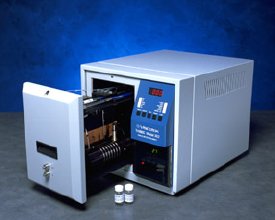Mar 25 2008
Viscotek has announced a new applications report that describes a Flow Injection Polymer Analysis (FIPA) technique that provides superior results to traditional methods for gravimetric determination of xylene soluble polymers.

In this report entitled 'FIPA for xylene soluble determination of polypropylene and impact copolymers' the authors compare the Viscotek FIPA experimental procedures with the traditional gravimetric method used to determine xylene solubles in process polymers. The xylene soluble test is designed to measure the amorphous content of polypropylene and ethylene-propylene rubber materials. The accuracy and precision of the xylene soluble test are very important to the process and product specifications of the resultant materials.
Using an ethylene-propylene rubber polymer - identical samples were analysed by both the gravimetric and Viscotek FIPA methods. A correlation factor of 0.9998 shows a high degree of agreement between the results obtained by the two methods. The report goes on to demonstrate the speed, accuracy, precision and additional molecular weight / intrinsic viscosity information advantages offered by the Viscotek FIPA technology that are driving many polypropylene producers and catalyst research organisations to adopt the new technique as their preferred method. When compared to the open vessel operation of the gravimetric method, the new Viscotek FIPA technique offers additional health and safety benefits. Even in laboratories with a moderate sample load, the time and labour savings made compared to the traditional method can easily pay for a system in less than one year.
The proprietary Viscotek FIPA technique is based upon a fast chromatographic means of separating polymers from the low molecular weight matrix of additives, monomers, or solvent they may be mixed with. The separated polymer is then detected by a proprietary triple-detector system, and the resulting peaks analysed to obtain properties of the polymer. The FIPA technique yields precise and accurate average molecular weight, molecular size, intrinsic viscosity and data on branching or copolymer composition in only a few minutes, without the need for elaborate sample preparation. Robust and easy to configure, the Viscotek FIPA system operates up to 80C allowing screening of most polymers including polycarbonates, polyacrylates, olefins, rubbers, polyimides, polystyrene, and polyvinylalcohol.
For a copy of the Xylene solubles applications report and further information on the FIPA system please contact Viscotek on telephone +44-1344-467180 or email [email protected]